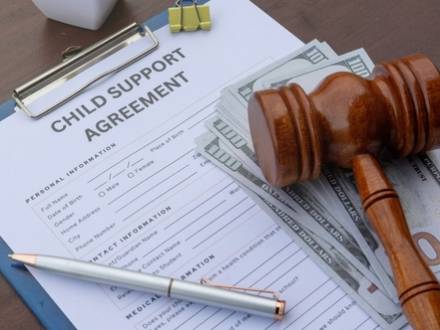Recent Blog Posts
Can I Revoke Custody if My Co-Parent Isn't Actually Spending Time with Our Child?
 When you share custody with your ex-partner, it's fair to expect that both of you will use your designated time to bond with your child. But what happens when your co-parent consistently skips visits or cancels plans? Or, what if your child comes home with reports that their other parent is hardly ever around when the child is at their house?
When you share custody with your ex-partner, it's fair to expect that both of you will use your designated time to bond with your child. But what happens when your co-parent consistently skips visits or cancels plans? Or, what if your child comes home with reports that their other parent is hardly ever around when the child is at their house?
If your co-parent is not actually using their parenting time to parent, you may want to know if you can have that time instead. An Addison family law attorney can help you understand your options.
Are There Any Laws in Illinois About How Parenting Time Must Be Used?
Not in a general sense, but Illinois law does expect parents to act in their child's best interests. Parents have both rights and responsibilities when it comes to parenting time.
Do I Have to Keep Supporting My Spouse's Parents After We Divorce?
 It’s common for adult children and their spouses to help support their parents financially in their old age, especially if something like medical expenses have drained the parent’s retirement fund. If you have been financially supporting your in-laws during your marriage, you may want to know whether you will still have to after your divorce is finalized.
It’s common for adult children and their spouses to help support their parents financially in their old age, especially if something like medical expenses have drained the parent’s retirement fund. If you have been financially supporting your in-laws during your marriage, you may want to know whether you will still have to after your divorce is finalized.
The good news for anyone going through a divorce in 2026 is that Illinois law does not require you to continue supporting your former in-laws. If you have concerns about financial obligations related to your divorce, a Kendall County divorce lawyer can help you understand your rights and responsibilities.
Is an Uncontested Illinois Divorce Fair?
 If you are considering a divorce in 2026, you may have heard the phrase "uncontested divorce." An uncontested divorce is a divorce in which couples agree on all major issues, like property and debt division, spousal support, and parenting responsibilities. Divorce is never truly easy, but uncontested divorce tends to streamline the process and make it less stressful for everyone involved.
If you are considering a divorce in 2026, you may have heard the phrase "uncontested divorce." An uncontested divorce is a divorce in which couples agree on all major issues, like property and debt division, spousal support, and parenting responsibilities. Divorce is never truly easy, but uncontested divorce tends to streamline the process and make it less stressful for everyone involved.
Is uncontested divorce always fair to both spouses, though? Unfortunately, no. It is a great option when it works, but sometimes one spouse gets less than they should from the agreement. Understanding what makes an uncontested divorce fair or not can help protect you from committing to one if it's not a good idea. If you are worried about whether you’ll get a fair deal out of an uncontested divorce, our Will County divorce attorney can help you understand whether this option is right for you. Call 630-785-2400 today to schedule your free 30-minute consultation.
What is Post-Decree Child Support Modification In Illinois?
c Even if your 2026 divorce arrangements go well, life continues to change. Jobs shift, children grow, and financial situations change. Illinois law understands this and allows parents to modify child support orders when needed.
Even if your 2026 divorce arrangements go well, life continues to change. Jobs shift, children grow, and financial situations change. Illinois law understands this and allows parents to modify child support orders when needed.
"Post-decree child support modifications" refers to changes in child support payments after your divorce is finalized. "Post-decree" simply means anything that happens after the final order is signed.
Our DuPage County child support lawyers help parents navigate post-decree child support. Whether you need to modify an existing order or enforce payments, we can guide you through the process.
When Can Child Support Be Modified After Your Divorce?
Post-decree child support most commonly involves several different types of actions:
-
Court enforcement of unpaid child support through arrears (late payment) collection, contempt proceedings, or wage garnishment when payments are not made.
Financial Experts and High-Asset Divorce in Illinois
 Divorce can be more challenging when you're dealing with valuable or complicated property. Businesses, investments, and retirement accounts make the property division process more complex. These assets aren't always straightforward to understand or divide. As of 2025, Illinois courts often rely on financial experts when divorces involve complex or high-value assets. The Villa Park, IL divorce lawyer at The Law Offices of Robert F. Kramer, Ltd. can help you determine when these experts are needed and how they can support your case.
Divorce can be more challenging when you're dealing with valuable or complicated property. Businesses, investments, and retirement accounts make the property division process more complex. These assets aren't always straightforward to understand or divide. As of 2025, Illinois courts often rely on financial experts when divorces involve complex or high-value assets. The Villa Park, IL divorce lawyer at The Law Offices of Robert F. Kramer, Ltd. can help you determine when these experts are needed and how they can support your case.
What Do Financial Experts Do in High-Asset Illinois Divorce Cases?
Financial experts help explain money matters that can be difficult to understand. Judges need to base their decisions on clear information, not rough estimates or assumptions. These experts review your financial records and explain what your assets are worth and how they work. Their job is to provide facts without taking sides. Financial experts are especially helpful when assets involve future income or long-term value.
How Lifestyle Impacts Spousal Support in High-Income Divorces
 In high-income divorces, spousal support, commonly known as alimony or maintenance, is often one of the most detailed and closely reviewed issues. If you built a comfortable or high-end lifestyle, the court must decide how that standard of living should affect financial support after the divorce is final. Illinois law does not promise that life will stay the same, but lifestyle does influence how support is reviewed. With a thorough review of your circumstances, our Romeoville, IL spousal maintenance lawyer can help you understand how lifestyle may influence alimony in your case.
In high-income divorces, spousal support, commonly known as alimony or maintenance, is often one of the most detailed and closely reviewed issues. If you built a comfortable or high-end lifestyle, the court must decide how that standard of living should affect financial support after the divorce is final. Illinois law does not promise that life will stay the same, but lifestyle does influence how support is reviewed. With a thorough review of your circumstances, our Romeoville, IL spousal maintenance lawyer can help you understand how lifestyle may influence alimony in your case.
Why Does Lifestyle Matter in High-Income Divorce Cases?
In Illinois, courts look at several factors when deciding whether spousal support should be awarded and in what amount. According to 750 ILCS 5/504, one of the main factors is the standard of living during the marriage.
How Is Child Support Calculated in Illinois?
 Financial stability for children is a priority when parents split. Illinois courts use a specific formula to make sure both parents contribute to their child’s care. The calculation is based on parental income, parenting time, and the child’s everyday needs. With help from our Oswego, IL child support lawyer, you can better understand what to expect.
Financial stability for children is a priority when parents split. Illinois courts use a specific formula to make sure both parents contribute to their child’s care. The calculation is based on parental income, parenting time, and the child’s everyday needs. With help from our Oswego, IL child support lawyer, you can better understand what to expect.
What Formula Does Illinois Use to Calculate Child Support?
Under 750 ILCS 5/505, Illinois courts use the income shares model to calculate child support. This formula estimates what both parents would spend on their child if they lived together. Then, it divides that cost between the parents based on how much each one earns.
The court starts by calculating each parent’s net income, then adds the two amounts together. A standard chart from the Illinois Department of Healthcare and Family Services shows how much of that combined income should be used for child support. Each parent is assigned a percentage of that total based on their income.
Can I Recover Money My Spouse Spent on an Affair?
 If you are going through a divorce, your finances are an integral part of the process. The court will identify marital assets and divide them based on Illinois’s equitable distribution laws. Should your spouse spend shared assets on an extramarital affair, you may be able to recover funds through an asset dissipation claim. A Lockport, IL divorce lawyer can help you evaluate the situation and advise you on what steps you may want to take based on your finances and the timeline of the marriage.
If you are going through a divorce, your finances are an integral part of the process. The court will identify marital assets and divide them based on Illinois’s equitable distribution laws. Should your spouse spend shared assets on an extramarital affair, you may be able to recover funds through an asset dissipation claim. A Lockport, IL divorce lawyer can help you evaluate the situation and advise you on what steps you may want to take based on your finances and the timeline of the marriage.
What Is Considered Asset Dissipation in Illinois?
Illinois treats marriage as a shared financial partnership. Most income earned and property acquired during a marriage is considered marital property. When spouses divorce, this property must be divided fairly under 750 ILCS 5/503.
What Happens if You Own Multiple Properties During Divorce in Illinois?
 The property division process that couples getting a divorce need to go through is typically more complex when you have many assets, like multiple real estate properties. Each property has its own history, value, and purpose. During a divorce, the court must decide who gets which property and how to divide any equity or debt. Because Illinois follows an equitable distribution system, property is divided fairly, and that may not necessarily mean an equal split. Working with an experienced Glen Ellyn, IL property division lawyer can help you ensure your assets are properly valued and divided.
The property division process that couples getting a divorce need to go through is typically more complex when you have many assets, like multiple real estate properties. Each property has its own history, value, and purpose. During a divorce, the court must decide who gets which property and how to divide any equity or debt. Because Illinois follows an equitable distribution system, property is divided fairly, and that may not necessarily mean an equal split. Working with an experienced Glen Ellyn, IL property division lawyer can help you ensure your assets are properly valued and divided.
How Do Illinois Courts Decide Who Gets Which Property In Divorce?
Under 750 ILCS 5/503, Illinois courts must first classify all property as marital or non-marital. Marital property includes anything that was bought during the marriage with joint funds. Non-marital property usually means things that were owned before the marriage or received by only one spouse as a gift or inheritance.
Can a Child Choose Which Parent to Live With in Illinois?
 In Illinois, children have a voice in custody cases. While their opinions matter, the law does not consider those opinions exclusively when making such decisions. Judges must look at several factors to decide what is truly in the child’s best interests. If you have questions about parental responsibilities, a Glendale Heights, IL child custody lawyer can help. We will guide you through the process and protect your child’s well-being.
In Illinois, children have a voice in custody cases. While their opinions matter, the law does not consider those opinions exclusively when making such decisions. Judges must look at several factors to decide what is truly in the child’s best interests. If you have questions about parental responsibilities, a Glendale Heights, IL child custody lawyer can help. We will guide you through the process and protect your child’s well-being.
At What Age Can a Child Choose Where They Live?
There is no specific age in Illinois at which a child can choose where they live. Under 750 ILCS 5/602.7, judges must consider the child’s wishes, but this is only one part of the overall decision. The child’s age, maturity, and ability to understand what is happening impact how much weight is given to their opinion.







